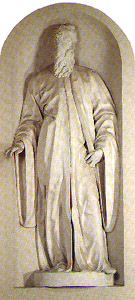
Sen. Girolomo Cornaro (B-64/H-1)
Born: c. 1485
Married: 31 May 1510, in Crete, Franceschina Muazzo
Died: 25 February 1551, Venice
SEN. GIROLOMO CORNARO was one of six sons of the powerful and fabulously wealthy Venetian leader Cav. Proc. Giorgio Cornaro (B-29), who was brother of Queen Caterina Cornaro (B-31) and founder of the Cornaro della Regina branch of the family. Three of Cav. Proc. Giorgio's sons entered the clergy, two rising to the level of Cardinal and one to Archbishop. Each of the other three sons sired a line of the family that was to sustain the wealth and power of the Cornaro della Regina branch of the family for generations. Sen. Girolomo was the progenitor of the S. Cassiano line. His brothers Proc. Giacomo Cornaro (B-62/F-1) and Cav. Proc. Giovanni Cornaro (B-63/G-1) were progenitors of the S. Maurizio and S. Polo lines, respectively. A galley captain in his early career, Sen. Girolomo served as Capitano [military commander] at Candia [Crete] and Padua. He was Deputy to the Fortifications at Zara [in present day Albania] in 1542, after serving, 1536-7, as Head of the Council of Ten.As Capitano at Padua, Sen. Girolomo commissioned, 1539, Domenico Campagnole and a group of local assisting artists to execute there in the former Carrara palace a Sala dei Giganti [Hall of Giants] with fresco portraits of illustrious men. The frescos recreated--with updated examples--the theme of an earlier Sala Virorum Illustrium, lost through the years, that had been inspired by Francesco Petrarch and commissioned, c. 1379, by Francesco da Carrara the Elder, then ruler of Padua. Among the artists assisting Campagnole in painting the replacement frescos--which are today on view in a building of the University of Padua--were Stefano Dall'Arzere, Giuseppe Porta and Lambert Sustris.
While serving as Capitano at Padua, Sen. Girolamo also initiated the family's association with Michele Sanmicheli, whom he commissioned to design the Paduan defense works known as Bastion Cornaro. During the same period Sen. Girolomo commissioned Sanmicheli to design the reconstruction of Villa Cornaro, the ruined family residence he had inherited at Piombino Dese. The manor house there had been burned by Imperial troops in 1507 or 1509 (or by French troops in 1511) during the devastating War of the League of Cambrai.
©
1997-9, 2005 C. I. Gable
